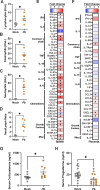This is a preprint.
Multi-System Dysregulation in Placental Malaria Contributes to Adverse Perinatal Outcomes in Mice
- PMID: 39868257
- PMCID: PMC11761038
- DOI: 10.1101/2025.01.15.633265
Multi-System Dysregulation in Placental Malaria Contributes to Adverse Perinatal Outcomes in Mice
Update in
-
Multi-system dysregulation in placental malaria contributes to adverse perinatal outcomes in mice.Infect Immun. 2025 Jul 8;93(7):e0002125. doi: 10.1128/iai.00021-25. Epub 2025 Jun 5. Infect Immun. 2025. PMID: 40470930 Free PMC article.
Abstract
Sequestration of Plasmodium parasites in the placental vasculature causes increased morbidity and mortality in pregnant compared to non-pregnant patients in malaria-endemic regions. In this study, outbred pregnant CD1 mice with semi allogeneic fetuses were infected with transgenic Plasmodium berghei or mock-inoculated by mosquito bite at either embryonic day (E) 6 (first trimester-equivalent) or 10 (second trimester-equivalent) and compared with non-pregnant females. P. berghei-infected mosquitoes had greater biting avidity for E10 dams than uninfected mosquitoes, which was not apparent for E6 dams nor non-pregnant females. Infected E10 dams had greater numbers of parasites than E6 dams in the uterus and spleen, but not in the blood or liver. While parasites were found in placentas, no parasites were present in fetuses. Maternal infection at E6 caused greater maternal morbidity, with greater rates of fetal reabsorption and stillbirths than at E10. Infection at E10 caused adverse offspring outcomes, including growth restriction. To identify possible mechanisms of adverse offspring outcomes, E10 dams were euthanized during peak parasitemia (8 days post infection), and outcomes were compared with mock-infected dams. P. berghei caused significant systemic maternal immune activation with elevated circulating lymphocytes, eosinophils, and neutrophils and splenic cytokine concentrations. P. berghei infection at E10 increased corticosterone and decreased progesterone concentrations, which could contribute to adverse perinatal outcomes through immunomodulation. There were limited changes in the maternal fecal microbiome after P. berghei infection. Mosquito bite infection of outbred dams with P. berghei causes placental malaria and provides a novel, tractable model to investigate therapeutic treatments.
Keywords: Plasmodium; corticosterone; cytokines; microbiome; pregnancy; progesterone.
Figures




References
-
- Okoko B.J., Enwere G., and Ota M.O., The epidemiology and consequences of maternal malaria: a review of immunological basis. Acta Trop, 2003. 87(2): p. 193–205. - PubMed
-
- Murphy S.C. and Breman J.G., Gaps in the childhood malaria burden in Africa: cerebral malaria, neurological sequelae, anemia, respiratory distress, hypoglycemia, and complications of pregnancy. Am J Trop Med Hyg, 2001. 64(1–2 Suppl): p. 57–67. - PubMed
Publication types
Grants and funding
LinkOut - more resources
Full Text Sources
